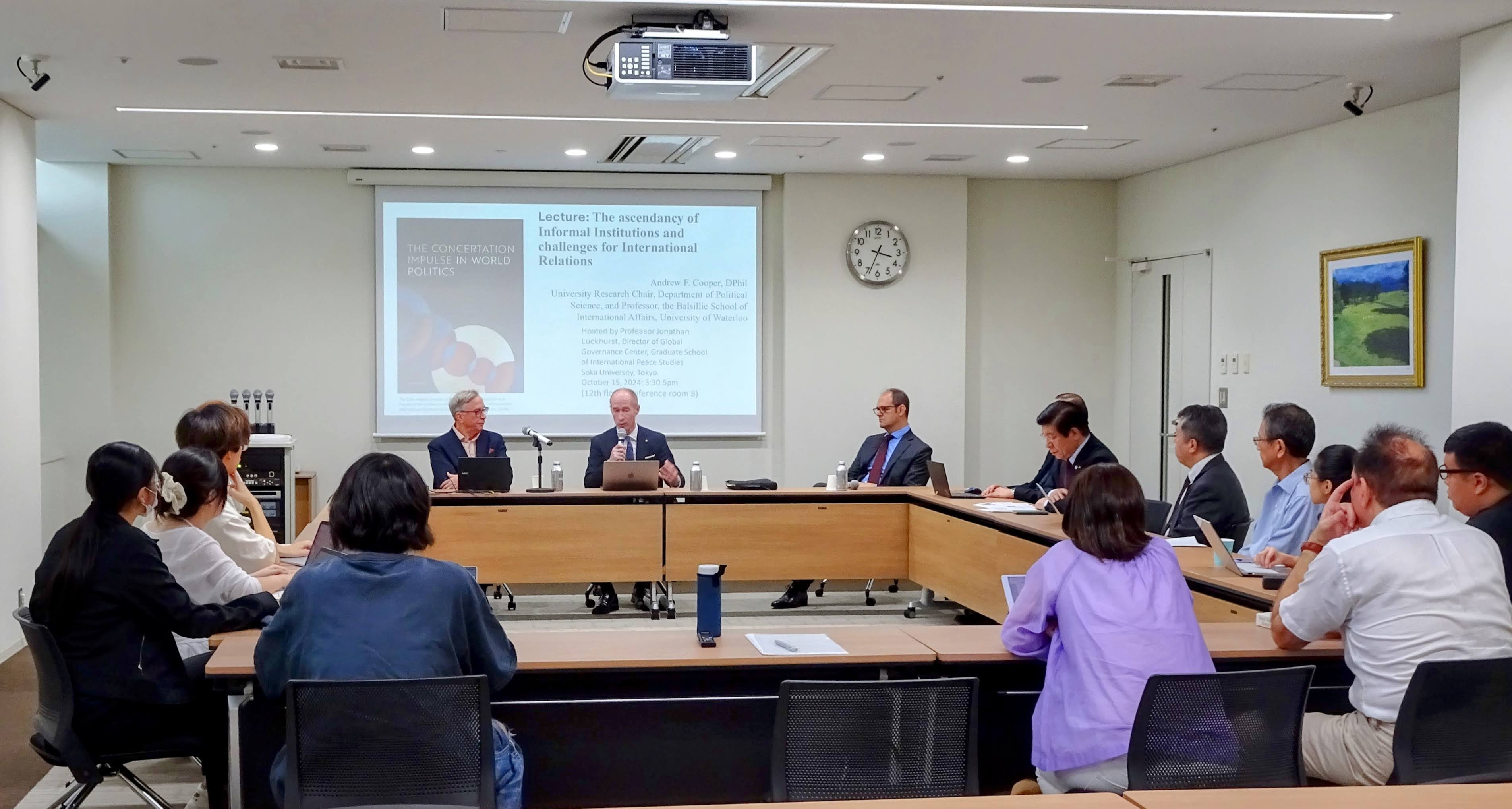カナダ・ウォータルー大学クーパー教授がGGCで講演されました Prof. Andrew F. Cooper’s Guest Lecture for the Global Governance Center

国際的に著名なカナダの国際関係学者であるアンドリュー・F・クーパー教授(ウォータルー大学)が、グローバル・ガバナンス・センター(GGC)の招聘により、2024年10月15日に創価大学でゲスト講義を行いました。クーパー教授は、新著『The Concertation Impulse in World Politics(世界政治における協調の衝動): Contestation over Fundamental Institutions and the Constrictions of Institutionalist International Relations』(オックスフォード大学出版局、2024年)の主要なテーマについて論じました。講演後、クーパー教授は出席した教員や学生からの質問に答えました。
創価大学からは鈴木学長と玉井副学長が出席しました。このイベントは、ジョナサン・ラックハースト教授(GGCセンター長)とハルトムト・レンツ教授(GGC副センター長)が主催し、創価大学平和研究所が協力して開催されました。
Prof. Andrew F. Cooper (University of Waterloo), the internationally renowned Canadian scholar of international relations, was invited by the Global Governance Center (GGC) to give a Guest Lecture at Soka University on October 15, 2024. Prof. Cooper discussed key themes from his new book, The Concertation Impulse in World Politics: Contestation over Fundamental Institutions and the Constrictions of Institutionalist International Relations (Oxford University Press, 2024).
Following his presentation, Prof. Cooper answered questions from the audience of faculty and students. President Suzuki and Vice-President Tamai of Soka University were in attendance. The event was hosted by Prof. Jonathan Luckhurst and Prof. Hartmut Lenz, the directors of the GGC, in cooperation with the Soka University Peace Research Institute.


クーパー教授は自身の新著について語り、国際関係とグローバル・ガバナンスの最近の動向について重要な洞察を示しました。中心となる焦点は、21世紀におけるG20やBRICS(ブラジル、ロシア、インド、中国、南アフリカ)フォーラムなどの非公式なグローバル・ガバナンス機関の役割の拡大でした。クーパー教授の講演のもう1つの重要な側面は、国際機関に関する主流の合理主義および制度主義の研究に対する批判でした。特に、主流の研究は非公式なグローバル・ガバナンスの重要性の高まりと主要な特徴をほとんど検討していないと主張しました。
講義では、クーパー教授の分析のいくつかの重要な理論的側面が詳しく説明されました。これには、国際関係の分野におけるいわゆる英国学派の伝統、特に多元主義的および連帯主義的な「協調」または非公式な取り決めによる協力の永続的な影響に関する議論が含まれています。クーパー教授は、非公式な制度の重要性が高まっているにもかかわらず、制度主義および合理主義の国際関係学者は分析において公式な制度を優先し続けていると指摘しました。
クーパー教授は、主流の合理主義-制度主義によるグローバル・ガバナンスの説明の概念的枠組みにはいくつかの欠落があり、それが非公式なグローバル・ガバナンスのフォーラムへの焦点が不十分になっている原因になっていると指摘しました。その1つは、グローバル・ガバナンスにおけるG20の役割拡大に不可欠だった2008-09年の世界金融危機など、危機の影響に対する関心の欠如です。主流の学者は主に規範的な問題を避け、個人の主体や規範的な対立よりも制度構造の分析を好みますが、クーパー教授はこれがグローバル・ガバナンスの実践における最近の変化を理解する鍵であると主張しています。
講演では、グローバル・サウス、特にグローバル・ガバナンスに対するその影響力の拡大、およびグローバル・ノースが支援する既存の制度的枠組みに対する潜在的な連帯主義的反対または多元主義的関与の間の緊張に興味深い焦点が当てられました。クーパー教授の包括的な議論と結論は、公式な制度が重要ではないということではなく、国際関係において、単独主義や二国間主義ではなく、非公式のフォーラムまたは機関が前者に対する主な「制度的」挑戦者であるというものでした。
クーパー教授の新著は、この講演の基礎となりました。2024 年にオックスフォード大学出版局から出版されたこの本は、グローバル・ガバナンスに対する合理主義的制度主義的アプローチに対する説得力のある批判を構成しています。この本は、おそらく最も影響力のある英国学派の学者であるヘドリー・ブルの主要な議論を復活させ、適応させ、非公式なグローバル・ガバナンスを通じた協調の重要性の高まりに関する革新的な分析を行っています。この本は、グローバル・ガバナンスの実務家だけでなく、国際関係の学者や学生にも重要な影響を与えることは間違いありません。
Prof. Cooper’s discussion of his new book gave important insights into recent developments in international relations and global governance. The core focus was the growing role of informal global governance institutions, such as the Group of Twenty (G20) and BRICS (Brazil, Russia, India, China, South Africa) forums, in the twenty-first century. Another key aspect of Prof. Cooper’s presentation was his critique of mainstream rationalist and institutionalist literature on international institutions. He argued, in particular, that the mainstream literature had largely failed to examine the growing significance and key features of informal global governance.
The lecture expanded on some important theoretical aspects of Prof. Cooper’s analysis. This incorporated arguments from the so-called English School tradition in the field of International Relations, particularly on the enduring influence of pluralist and solidarist forms of ‘concertation’ or cooperation through informal arrangements. Prof. Cooper noted that institutionalist and rationalist International Relations scholars have continued to prioritize formal institutions in their analysis, despite the increasing salience of informal ones.
Prof. Cooper indicated several omissions in the conceptual framework of mainstream rationalist-institutionalist accounts of global governance, which contributed to an insufficient focus on informal global governance fora. One was their lack of interest in the impact of crises, such as the 2008-09 global financial crisis that was crucial for the augmented role of the G20 in global governance. Mainstream scholars mostly avoid normative issues, with their preference for analyzing institutional structures rather than individual agency and normative contestation, which Prof. Cooper argues are key to understanding recent shifts in global governance practices.
The presentation included an interesting focus on the Global South, especially its expanding influence in global governance, as well as the tension between potential solidarist opposition or pluralist engagement with established, Global North-supported institutional frameworks. The overarching argument and conclusion from Prof. Cooper was not that formal institutions do not matter, but that informal fora or institutions – rather than unilateralism or bilateralism – are the main ‘institutional’ challenger to the former in international relations.
Prof. Cooper’s new book was the basis for his presentation; published by Oxford University Press in 2024, it constitutes a compelling critique of rationalist-institutionalist approaches to global governance. It revives and adapts key arguments from Hedley Bull, arguably the most influential English School scholar, in an innovative analysis of the growing importance of concertation through informal global governance. This book is sure to have an important influence on International Relations scholars and students, in addition to global governance practitioners.


